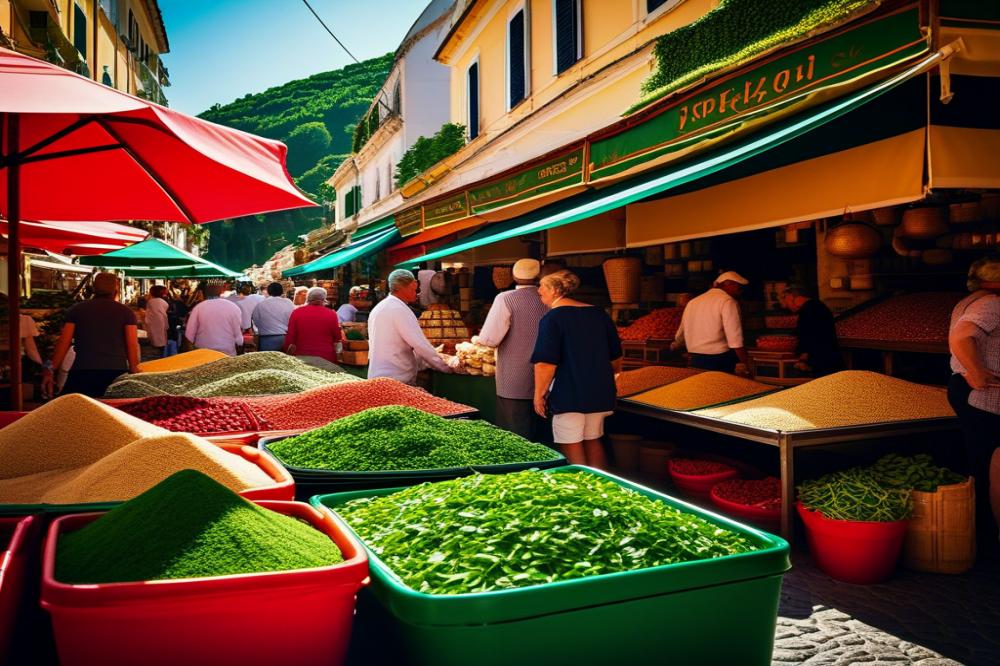Exploring the Herb and Spice Markets in Corfu
Corfu stands out as a captivating culinary destination, enchanting visitors with its vibrant food culture and delicious flavors. Nestled in the Ionian Sea, this Greek island is known not only for its breathtaking landscapes but also for its rich culinary traditions. Dining on Corfu often means indulging in dishes infused with a variety of fresh ingredients, many of which come from the island’s lush surroundings.
In Mediterranean cuisine, herbs and spices play a crucial role. They enhance flavors, add depth to meals, and create the distinctive taste that characterizes the region. Greek herbs, such as oregano, thyme, and basil, are staples in many kitchens, transforming simple dishes into delightful experiences. Visitors to Corfu can explore local markets, where the vibrant colors and aromatic scents provide an unforgettable sensory journey.
The bustling Herb Markets and Spice Markets of Corfu serve as windows into the island’s food culture. Here, locals and tourists alike immerse themselves in the sights and smells of fresh produce and seasonings. These market experiences not only offer a peek into the everyday life of the islanders but also provide opportunities to learn about the herbs and spices that make both home-cooked meals and restaurant dishes truly special.
The Rich History of Herbs and Spices in Corfu
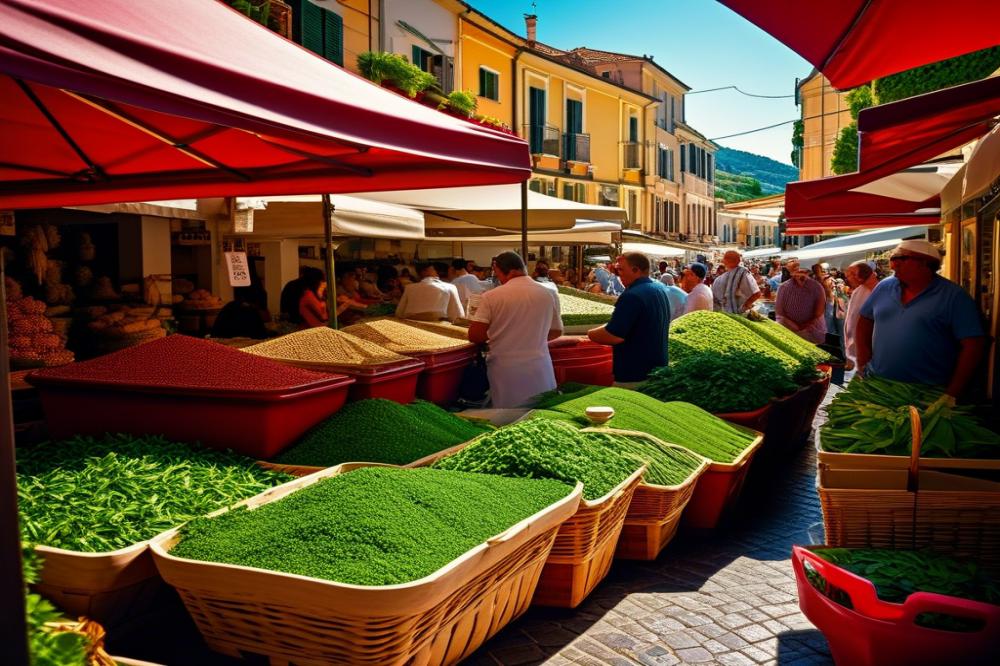
Corfu boasts a vibrant food culture shaped by centuries of culinary traditions. This island, nestled in the Ionian Sea, is a treasure trove of flavors inspired by many influences. Local markets teem with fresh ingredients, showcasing the island’s rich agricultural heritage. Traditional dishes often highlight the significance of various herbs and spices, creating a distinct taste that defines Mediterranean cuisine.
Throughout Greek culture, herbs have held great importance. They symbolize connection to the land and region’s history. Ancient Greeks used various botanicals not only for cooking but also for their medicinal properties. In Corfu, locals often rely on rich traditions that have been passed down through generations. Knowledge of Greek herbs has become intertwined with everyday life, connecting people with their roots.
The local geography of Corfu greatly impacts the diversity of herbal varieties found on the island. Rolling hills and rocky coastlines support numerous plant ecosystems. As a result, herbs such as oregano, thyme, and rosemary flourish in abundance. Climate conditions create an environment ideal for growing these fragrant plants, adding depth to regional dishes. Visitors can savor unique flavors that cannot be found elsewhere.
Exploring the Herb Markets will reveal a fascinating blend of flavors and aromas. Each stall invites customers to discover something new. Local vendors often share their personal stories and uses for different herbs and spices. Such market experiences provide insight into the everyday life of Corfiots and their relationship with the land.
Tourism further enhances the island’s culinary scene. Many travelers come seeking authentic tastes, eager to experience what Corfu has to offer. They walk among the stalls, sampling fresh ingredients and learning about their uses in traditional recipes. Each visit reveals the enduring legacy of Corfu’s rich herbal history, showcasing an age-old passion for food and flavor.
Exploring Local Herb Markets
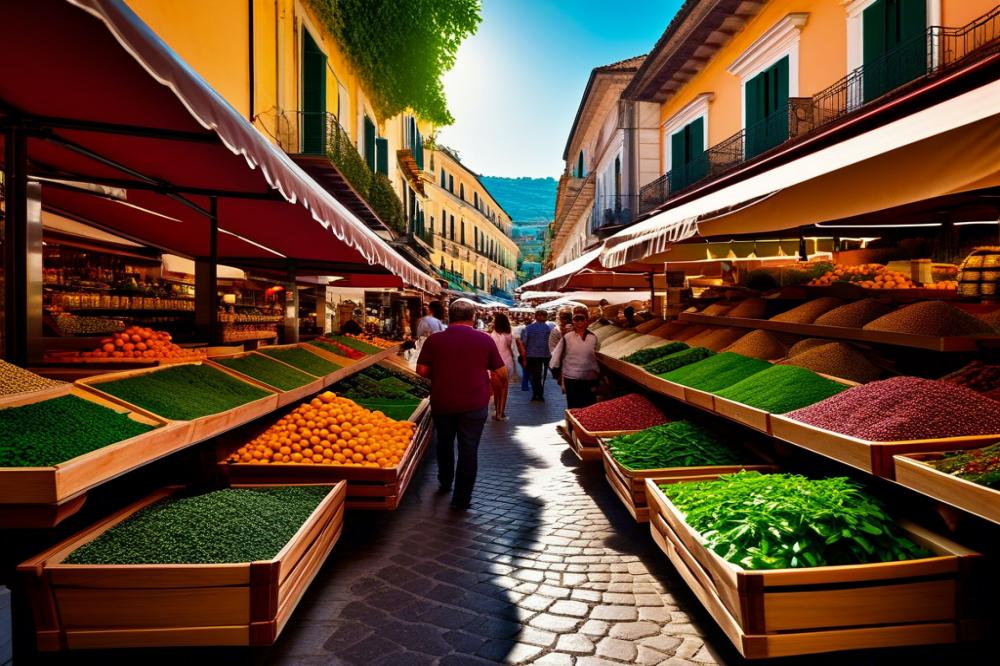
Description of Popular Herb Markets in Corfu
Corfu is home to vibrant local markets that showcase a variety of herbs and spices. In these bustling spots, visitors can discover the essence of Mediterranean cuisine. Some markets, like the Old Fortress Market, stand out for their authentic offerings. The colorful displays draw your attention. Freshly picked herbs, such as oregano and thyme, fill the air with aromatic scents. Here, shoppers often find stalls overflowing with spices such as cinnamon and cumin. The energy in these markets is palpable, a true reflection of the island’s food culture.
Overview of Market Experiences for Visitors
Interacting with friendly vendors is a highlight of any visit. Many locals take pride in sharing their knowledge of culinary traditions. Vendors are eager to provide samples, allowing guests to taste the flavors of Greece. This interaction creates a warm and welcoming atmosphere. Visitors can learn tips on how to use these herbs and spices in their cooking. The vibrant colors of the herbs and spices create a visual feast. Enthusiastically browsing through the stalls is a delightful experience. Each visit offers something new, whether it’s a rare herb or a locally crafted spice blend.
Key Vendors and Their Specialties
Among the key vendors, one can find Maria, known for her incredible selection of Greek herbs. She offers dried bay leaves and wild sage harvested from the local hills. Her grandmother’s recipes often inspire her products. Another popular vendor is Nikos, who specializes in unique spice blends. His mix of spices is sought after by both locals and tourists. He loves sharing stories and cooking tips with customers. Both vendors embody the deep culinary heritage of Corfu. Visitors leave not just with herbs and spices but with memories and knowledge to share.
Popular Greek Herbs and Their Uses
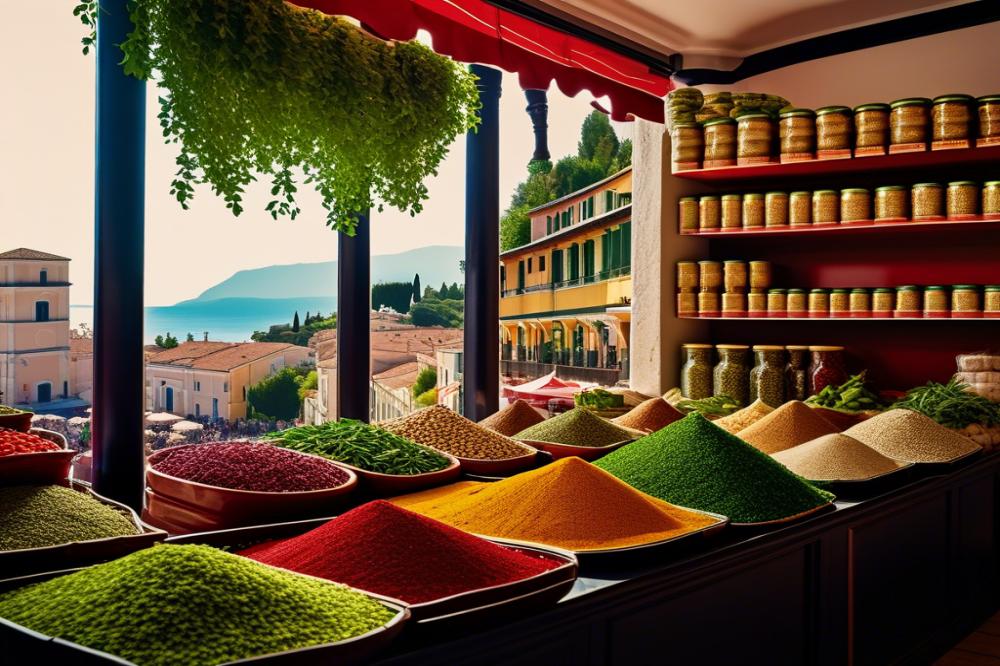
In the vibrant local markets of Corfu, a variety of Greek herbs catch the eye and inspire culinary creativity. Basil, oregano, and thyme are among the most prevalent. Visitors often spot these herbs displayed in baskets or hanging in bunches, adding a fragrant touch to the market atmosphere. These herbs play a fundamental role in Mediterranean cuisine.
Basil, known for its aromatic leaves, adds depth to many local dishes. It finds its way into sauces, salads, and is even sprinkled atop pizzas. Similarly, oregano serves as a crucial ingredient in Greek salads and grilled meats. The robust flavor enhances these traditional meals and connects diners to the island’s food culture.
Medicinal properties are often attributed to these herbs as well. For centuries, people have used thyme as an antiseptic and a remedy for coughs. Oregano is believed to have antioxidant effects, often celebrated in Greek traditions. These benefits highlight how these ingredients intertwine with the cultural significance of the island.
The experience of exploring Corfu’s herb markets goes beyond just flavors and smells. Customers engage with local vendors who often share stories about their products. Each herb has its history, and that personal touch enriches the shopping experience. This connection to the land, combined with extensive culinary traditions, creates a unique atmosphere that tourists cherish.
In addition to their culinary roles, Greek herbs symbolize the essence of Corfu’s lifestyle. They showcase the island’s rich agricultural heritage. Corfiots take pride in their roots, using these natural ingredients in both everyday meals and festive occasions. The market offers a glimpse into this enduring relationship between culture, community, and cuisine.
The Role of Spices in Corfu’s Food Culture
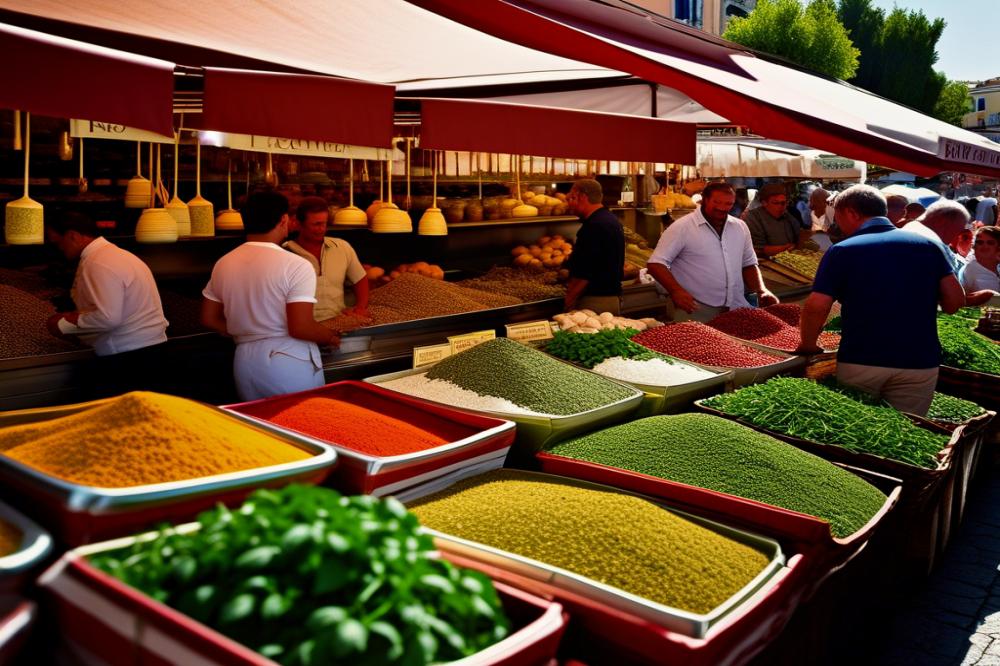
Exploring the local markets in Corfu offers a colorful insight into the world of spices. Vendors display various herbs, each with distinct aromas that fill the air. Common spices such as cinnamon, oregano, and saffron attract visitors with their vibrant hues and fragrant qualities. Additionally, locals value these ingredients not just for flavor, but also for their medicinal properties. Each spice carries a piece of the island’s culinary traditions.
Greek cuisine exhibits a unique relationship between herbs and spices. Herbs typically come from the plant’s leafy parts, offering freshness to dishes. Examples include dill and parsley, which are staples in many meals. Spices, on the other hand, are derived from roots, seeds, and fruits. They deepen flavors, contributing warmth and complexity to various recipes. Understanding these differences is key for anyone wanting to appreciate the local food culture fully.
Spices play a crucial role in enhancing traditional Mediterranean dishes. For instance, a pinch of aromatic cumin can transform a simple vegetable stew into a hearty delight. Similarly, a sprinkle of sumac brings zesty brightness to salads and grilled meats. Common dishes that showcase these spices include moussaka and dolmades. Tourists often leave their meals with a newfound appreciation for the bold flavors that spices introduce.
Visitors to the local markets experience more than just shopping. Engaging with local vendors opens doors to stories of their culinary practices. These interactions often lead to discovering new spices that might not be familiar to travelers. Each spice conveys a sense of place, transporting tasters to the Mediterranean heartland. Corfu’s rich culinary tapestry reflects both its history and the influences of neighboring regions.
Culinary Adventures: What to Do in Corfu
The island of Corfu offers numerous opportunities for culinary enthusiasts. Cooking classes featuring herbs and spices are widely available. These classes not only teach techniques but also highlight the importance of Greek herbs in Mediterranean cuisine. Participants can learn to use fresh ingredients and elevate their home-cooked meals.
Consider joining a food tour that includes visits to local markets. These experiences allow you to explore the vibrant stalls filled with fresh produce, colorful spices, and aromatic herbs. Tour guides often share insights about the region’s food culture, connecting visitors to Corfu’s rich culinary traditions. Sampling local dishes while wandering through the markets enhances appreciation for the island’s flavors.
Many herbs native to Corfu can easily transform everyday meals. Fresh oregano, used in various dishes, brings a robust flavor to salads and grilled meats. Other herbs like dill and mint are perfect for dressings or sauces. Incorporating these ingredients not only enriches taste but also connects you to the Mediterranean way of life.
Discovering traditional recipes that highlight local spices can deepen the experience of visiting Corfu. Visitors are encouraged to experiment with incorporating walnuts, garlic, and saffron into their cooking. These elements create authentic dishes reflective of the island’s culinary heritage. Engaging in these activities allows travelers to take home a piece of Corfu’s culture.
Final Thoughts on Corfu’s Culinary Treasures
Exploring the vibrant herb markets in Corfu reveals much about the island’s rich culinary culture. Visitors can discover how local ingredients shape the flavors of traditional dishes. These markets are not just about buying; they offer a chance to connect with farmers and learn about their practices. Engaging with locals enhances the travel experience and fosters a deeper appreciation for the food on your plate.
The role of culinary tourism has grown significantly. Tourists seek more than just sightseeing; they want to taste and understand local food culture. By immersing oneself in the scents and sights of the herb market, one can experience firsthand the essence of Corfu’s gastronomy. Each herb tells a story of the island’s history and traditions.
Herbs and spices define the character of each meal. They contribute not only flavor but also convey the spirit of the location. From the earthy aromas of oregano to the fresh notes of dill, each ingredient plays a part in making Corfu’s cuisine distinctive. Learning about these elements allows visitors to appreciate the artistry behind local dishes.
In conclusion, a trip to Corfu’s herb markets is not just a shopping adventure; it is an exploration of culture. Encouraging culinary tourism helps preserve these traditions. The flavors found in this beautiful region are unforgettable, and the stories behind them are even more enriching. Embrace the opportunity to experience the heart of Corfu through its amazing herbs.

